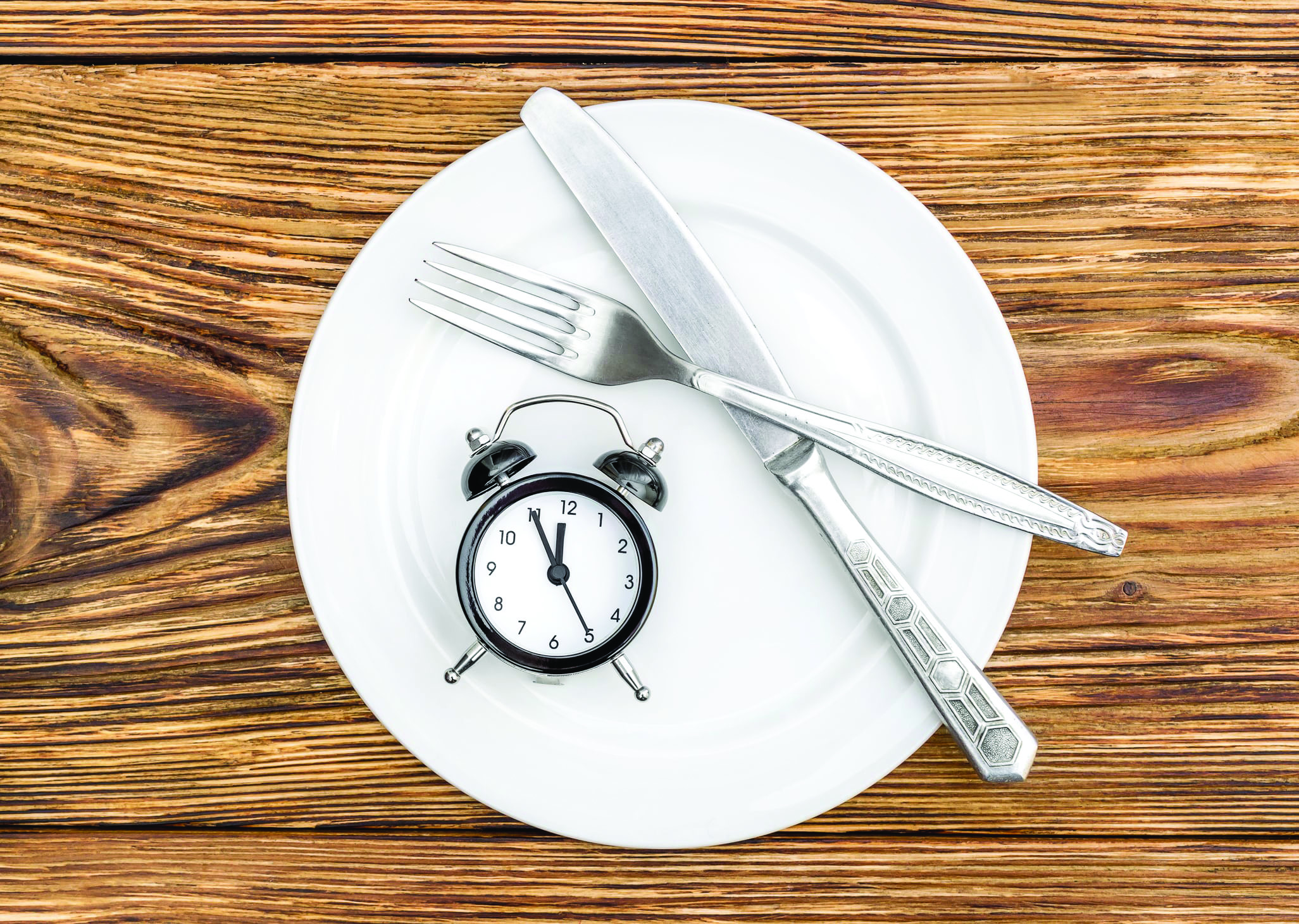Diets come and go, making it difficult to know what’s right and what’s wrong. The truth is, the best diet is one you can sustain. In this article, I will discuss the benefits of AND some possible downsides to intermittent fasting. I will share research and provide links so you can make the best decision for your health. It’s important to note that if you plan to start a fasting regimen you should consult your doctor first and be under his/her supervision.
What is Intermittent Fasting?
Intermittent fasting is the process of eating, or lack of eating, for a specified period of time. This can include fasting for a full 24 hours once a week (or more) to 14-16 hours, 2-7 times a week. The idea is to limit consumption of food and drinks (excluding water) for a period of time. The most popular in recent years has been the 14:10 or 16:8, which requires you fast for 14 or 16 hours a day, eating only during the remaining window of time. Intermittent fasting is daily, time-restricted feedings. Examples are:
5:2–Fast 2 days out of 7 and eat during an 8-hour window.
14:10–Daily fasting in which you fast for 14 hours and eat in the 10-hour window. Last meal is at 7pm which means you don’t eat again until 9am the next day.
16:8–Daily fasting in which you fast for 16 hours and eat in the 8-hour window. Last meal is at 7pm which means you don’t eat again until 11am the next day.
18:6–Daily or every other day fast in which you fast for 18 hours and eat in the 6-hour window.
24-36 hour fast every 30 days
Benefits of Intermittent Fasting
Although many people turn to intermittent fasting for weight loss, there have been numerous animal studies and human clinical trials which have shown health improvements that span far beyond weight loss. Japanese cell biologist Yoshinori Ohsumi won the Nobel Prize in Medicine in 2016 for his research on how “cells recycle and renew their content, a process called autophagy.” His numerous studies point to the theory that fasting activates autophagy, which can delay the aging process and has a “positive effect on cell renewal.” Ohsumi believes that fas ting can promote our body to heal faster, prevent certain diseases, and slow down the aging process. The journal of medicine cited in Bluezones.com states that “Ohsumi’s research from the late 1980s and early 1990s through today has shown autophagy has a role in protection against inflammation and in diseases like dementia and Parkinson’s. When Ohsumi started researching autophagy, there were fewer than 20 papers published each year on the subject; now there are more than 5,000 each year, as it is the subject of diverse fields including cancer and longevity studies.”
In terms of weight loss, intermittent fasting works well because it places you in a deficit. Those that follow fasting hours find they eat less and have fewer cravings. The 8- or 10-hour window limits how much food you can consume, therefore, without trying too hard, you end up reducing overall calorie intake by 15-20%. As we all know, diabetes, heart disease, and many other diseases are best controlled through diet, exercise, and maintaining a healthy weight. That’s why people find intermittent fasting to be easy to follow and maintain for the long haul.
In Europe, the 5:2 diet, also known as the 500-calorie diet, has taken off. The concept is to eat 500 calories for 2 days (600 calories for men) and then eat normally the other 5 days. The idea is to put yourself into a deficit without having to diet every day. A lot of people like this because they feel they can commit to 2 days of restricted eating rather than 7. Here’s what a day of 500 (600) calories would look like: Breakfast of 2 eggs and vegetables or a piece of fruit. Early dinner of fish, chicken or lean protein with steamed or grilled vegetables. No starchy carbs at all. The other five days, eat whatever you like. For more on the 5:2 diet check out forbes.com/hotnewfastingdiet.
The Downside to Intermittent Fasting
The biggest complaint with intermittent fasting is it is not sustainable for social lives. We live in a culture where food, drinks, pretty much anything we want or desire is readily available to us. We’re constantly bombarded with new, hip restaurants, fast food, breweries, wineries, social gatherings, all of which encourage us to indulge. To top it off, when we want to eat, the process is simple, fast, and requires little to no work on our part. A hundred years ago, if we wanted dinner we had to dig out the plants, hunt the meat, and walk for water. Today, we stop by the grocery store or swing by the fast-food window for our meals.
It’s important to note that in order for fasting to be successful you must have self-control. People that enjoy snacking have the hardest time because they are used to filling time with food, especially if they work from home! The other challenge with fasting is overeating during the eating window. People are so hungry, they eat anything and everything when it’s time to break fast. If you can relate to any of these challenges keep reading for tips on how to overcome them. Below are tips, not medical advice, and you should always check with your doctor before starting any diet program.
How to Make Intermittent Fasting Work
Start with a smaller fasting window, like the 14:10, for a couple days, and see how that leaves you feeling.
Prepare your meals beforehand. If you don’t physically prepare the meal, at least have it written down so you know what to eat when it’s time to break fast. This will prevent you from eating everything in sight.
Drink lots of water. Some people choose to drink black coffee or tea during their fasting window; however, true fasting requires no drinks aside from water.
Eat wholesome food during your eating window. Stick to nutritious foods like whole grains, lean proteins, vegetables, fruits, and healthy fats.
Try to eat 2 large meals rather than a bunch of little meals.
Add a sprinkle of salt in your water to maintain a healthy balance of sodium.
The healthiest plan is one that is balanced and sustainable. Fasting seems to have a lot of benefits but if you don’t prepare it can lead you down a path of overeating and overindulging during feeding hours. If you decide to try intermittent fasting, be certain to consult your physician first.
Nidaa Hossenlopp is a personal trainer and creator of Trufitness with Nidaa. She is a wife, mother of 2, and dedicated to educating women and men about the benefits of exercise for the mind, body and soul. For more health and fitness ideas or questions about your fitness journey contact her at trufitnesswithnidaa@gmail.com or visit her website at trufitnesswithnidaa.com. You can also follow Nidaa on Instagram @trufitnesswithnidaa and Facebook @Trufitness with Nidaa.








